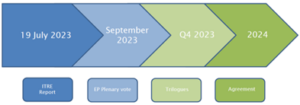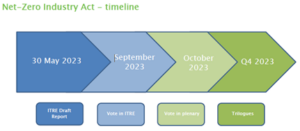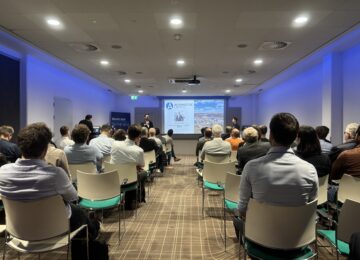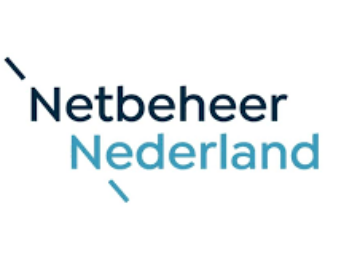Better integration of energy storage into European electricity market
The Electricity Market Design - proposal, the ITRE Draft report and the Net-Zero Industry Act - proposal are all aimed at improving electricity market design and promoting sustainability. They recognize the importance of energy storage as a critical technology for achieving a reliable, flexible and climate-neutral energy system. The proposals seek better integration of energy storage into the electricity market, setting targets and creating support mechanisms. They emphasize the importance of flexibility, efficient permitting procedures, strategic projects and innovation. Taking these proposals together creates a consistent and coordinated framework to strengthen the role of energy storage and contribute to the European Union's energy transition and climate goals.
European Commission presents electricity market design review with focus on energy storage
The European Parliament, through its ITRE committee, adopted a endorsed to support flexibility without fossil fuel use and energy storage, ahead of the trilogue negotiations on the Electricity Market Design. A final agreement has not yet been reached, but the ITRE committee has reached an agreement that would require binding targets for energy storage. EU countries are further behind in the negotiations and the agreement they are likely to reach would recommend that member states set a non-binding target for flexibility. The positions are not yet fully aligned, but there is some overlap. EASE (The European Association for Storage of Energy), of which Energy Storage NL is a member, actively participated in the drafting process and made valuable contributions to highlight the impact of various provisions on energy storage. The same was done with the ITRE draft report and the European Parliament's proposed amendments. The European Commission's agreement also contains 10 recommendations related to energy storage.
Main proposals related to energy storage:
- Flexibility assessments: By January 2025 and every two years thereafter, the regulatory authorities of each member state will be required to assess flexibility needs in the electricity system with a 5-year horizon. This should distinguish between seasonal, daily and hourly flexibility needs.
- Flexibility targets: Member states should set indicative national targets for both demand response and energy storage in their national energy and climate plans. This encourages the integration of flexible solutions into the energy system.
- Flexibility support systems: Member states have the option of establishing specific support systems for energy storage and demand response. These systems promote the development and implementation of flexible technologies.
- Peak Shaving Products: Transmission System Operators (TSOs) will have the opportunity to purchase market-based peak shaving products. These products reduce electricity demand during peak hours, contributing to a more efficient and resilient power system.
- Power Purchase Agreements (PPAs): Member states are encouraged to facilitate the use of PPAs to meet the goals of their national energy and climate plans. This encourages the growth of renewable energy generation and energy storage.
- Capacity Mechanisms: Member states are advised to introduce additional criteria or functions in capacity mechanisms to encourage the participation of non-fossil flexibility. This encourages a broader diversity of flexible capacity in the system.
- System operators: New tariff methodologies for Transmission System Operators (TSOs) and Distribution System Operators (DSOs) should take into account a balance between capital expenditure (CAPEX) and operational expenditure (OPEX). This promotes the use of flexibility services and contributes to efficient power system management.
The electricity market design review highlights the growing role of energy storage as a crucial component of a flexible, sustainable and resilient energy system. EASE remains committed to representing the interests of energy storage in Europe and will work closely with the European Commission and relevant stakeholders to promote the further development and implementation of energy storage.
For more information on EASE's views on the proposal and electricity market design review, please find here.
ITRE Draft report to improve electricity market
ITRE publishes preliminary amending regulations To improve electricity market and increase climate contribution.
On May 12, 2023, the European Parliament Committee on Industry, Research and Energy (ITRE) published a preliminary version of amending regulations aimed at improving the design of the electricity market. The amending regulations focus on adapting EU regulations (EU) 2019/943 and (EU) 2019/942, as well as directives (EU) 2018/2001 and (EU) 2019/944, to significantly expand the scope of the file to all technologies that can contribute to climate change mitigation.
- Flexibility assessments: National flexibility needs assessments must now assess congestion within a bidding zone, ancillary services, renewable energy curtailment and two scenarios: a business default and high gas prices. These comprehensive assessments contribute to a more accurate assessment of electricity system flexibility needs.
- Flexibility targets: The proposed target should be split into two parts: one for energy storage and one for demand response. Here the word "indicative" has been removed, indicating that the targets will be binding. This emphasizes the importance of energy storage and demand response as crucial pillars of the energy transition.
- New EU-wide strategy for energy storage and demand response with targets: Following the 10-year National Energy and Climate Plans (NECPs), the European Commission will develop a strategy for demand response and energy storage in 2025. If necessary, minimum targets will be set at the European level to promote the development and implementation of these technologies.
- Support systems for flexibility: Support systems are no longer limited to new assets. Charging services for electric vehicles and hydropower plant storage are now included. In addition, location criteria have been included to ensure efficient use of flexible resources.
- Peak Shaving product: The Peak Shaving product is now limited to situations at the regional or European level during a price crisis. Both Transmission System Operators (TSOs) and Distribution System Operators (DSOs) can purchase this product. The Agency for the Cooperation of Energy Regulators (ACER) and the European Commission will ensure that this does not lead to market distortions. It is notable that there is no explicit opportunity for energy storage to participate in the Peak Shaving product.
- Joint EU-wide market revenue ceiling for infra marginal producers: During periods of high prices, this cap would be activated, returning surplus revenue to consumers. This contributes to a fair and stable electricity market.
- System operators: both TSOs and DSOs will publish monthly information on available capacity. Information should also be shared on calculation methods, including constraint assumptions. This promotes transparency and efficiency in system operation.
The publication of the preliminary amendment regulations demonstrates ITRE's commitment to improving electricity market design and increasing its contribution to climate goals. Further discussions and negotiations will take place to refine and ultimately implement these proposals.

Net-Zero Industry Act - proposal
European Commission publishes Net-Zero Industry Act to promote energy storage and sustainability.
In March 2023, the European Commission adopted the Net-Zero Industry Act published in response to the Inflation Reduction Act (IRA). This legislation addresses sustainability in the industry and includes several key points related to energy storage. The following is a summary of these points:
- Energy Storage as a Strategic Net Zero Technology: Energy storage is recognized as one of nine Strategic Net Zero Technologies. This highlights the importance of energy storage as a critical component for achieving climate neutrality in industry.
- Faster and streamlined permitting procedures: Faster and more efficient permitting procedures will be implemented for production facilities. This will promote the accelerated development and implementation of energy storage projects in the industry.
- Special Procedures for Strategic Net Zero Projects: Special procedures will be established for Strategic Net Zero Projects. This creates a favorable framework for large-scale energy storage projects that contribute to achieving net zero emissions in the industry.
- Support for innovation: The Net-Zero Industry Act provides support for innovation, including through the introduction of regulatory sandboxes and support for small and medium-sized enterprises (SMEs). This encourages the development of new energy storage technologies and solutions.
- Access to skilled workers: Access to skilled workers in the energy storage sector is ensured. This promotes the growth of the sector and strengthens the human capital needed to implement and manage energy storage systems.
- Preferential treatment in public tenders: Net zero technologies, including energy storage, will receive preferential treatment in public tenders. This provides opportunities for companies in the energy storage sector to participate in projects aimed at achieving climate goals.
EASE was in intensive contact with the rapporteur and relevant members of ITRE during this process to represent the interests of energy storage. Some of EASE's key efforts were:
- Adapting the definition of energy storage to align with the provisions of the Clean Energy Package (CEP). This contributes to a consistent and harmonized definition of energy storage within European legislation.
- Addition of "contribute to energy security" as a criterion to define resilience and sustainability in the context of public procurement. This ensures that energy storage is recognized as a valuable contribution to the reliability and resilience of energy supply.
- Ensure streamlined access to existing EU funding instruments, such as the Innovation Fund, the Recovery and Resilience Fund and the Modernization Fund, for Strategic Net Zero Technologies. This facilitates financial support for energy storage projects and promotes their implementation.
With the publication of the Net-Zero Industry Act, the European Commission takes an important step in promoting energy storage and sustainability in the industry. EASE remains committed to representing the interests of energy storage and will work closely with the European Commission and other relevant stakeholders to promote the further development and implementation of energy storage.






